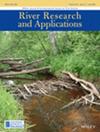The developing flood rich period: Science evidence and policy evolution for England. Is it time for place‐based socio‐ecological solutions?
IF 1.9
4区 环境科学与生态学
Q4 ENVIRONMENTAL SCIENCES
引用次数: 0
Abstract
Flood‐related policies for England are reviewed, updating needs in the light of recent flood‐rich decades and in recognition of future climate trends. This review updates one we published in 2021—a significant year for extreme floods in Europe that were part of a continuing trend; governments now require fast‐track adaptation and resilience policies. Currently, the event signals that increasing spatial and temporal variability of impacts are insufficiently incorporated in hazard/risk assessments. We advocate a transformative policy change towards place‐based strategies, based on the fast‐emerging evidence from three sciences: hydroclimatology, hydrology and hydromorphology. It is vital that policy actions recognise factors such as atmospheric rivers, surface water flooding, and the role of eroded and transported sediments in localised hazards and risks. Located vulnerabilities require local strategies. Attribution of extreme events to climate change, and the recognition and specification of genuinely vulnerable sites, need further refinement and extension into public decision making. Risk assessment needs reform, both from science but also for institutions and individuals, with accompanying reform of flood risk management expenditure. Data analysis of rainfall and river flows need more disciplined clarity; standard sets are needed together with their variable spatial/temporal application. We further recognise sediment hazards (and other entrained debris spread in flood flows) as new and important components for the located risk of present and emerging ‘hot spots’.发展中的洪水富集期:英格兰的科学证据和政策演变。现在是采取基于地方的社会生态解决方案的时候了吗?
我们对英格兰的洪水相关政策进行了审查,并根据最近几十年洪水频发的情况和未来的气候趋势更新了相关需求。本报告更新了我们在 2021 年发布的报告,这一年是欧洲极端洪水的重要一年,也是持续趋势的一部分;政府现在需要快速制定适应和抗灾政策。目前,这一事件表明,灾害/风险评估中没有充分考虑到影响在空间和时间上日益增加的可变性。我们主张根据水文气候学、水文学和水文形态学这三门科学快速涌现的证据,对政策进行变革,制定以地方为基础的战略。政策行动必须认识到大气河流、地表水洪水等因素,以及侵蚀和迁移沉积物在局部灾害和风险中的作用。当地的脆弱性需要当地的战略。将极端事件归因于气候变化,以及认识和明确真正的脆弱地点,都需要进一步完善并扩展到公共决策中。风险评估需要改革,既要从科学角度,也要从机构和个人角度,同时改革洪水风险管理支出。对降雨量和河流流量的数据分析需要更加严谨清晰;需要标准集及其不同的空间/时间应用。我们进一步认识到,泥沙灾害(以及洪流中传播的其他夹带碎片)是目前和新出现的 "热点 "地区风险的新的重要组成部分。
本文章由计算机程序翻译,如有差异,请以英文原文为准。
求助全文
约1分钟内获得全文
求助全文
来源期刊

River Research and Applications
环境科学-环境科学
CiteScore
4.60
自引率
9.10%
发文量
158
审稿时长
6 months
期刊介绍:
River Research and Applications , previously published as Regulated Rivers: Research and Management (1987-2001), is an international journal dedicated to the promotion of basic and applied scientific research on rivers. The journal publishes original scientific and technical papers on biological, ecological, geomorphological, hydrological, engineering and geographical aspects related to rivers in both the developed and developing world. Papers showing how basic studies and new science can be of use in applied problems associated with river management, regulation and restoration are encouraged as is interdisciplinary research concerned directly or indirectly with river management problems.
 求助内容:
求助内容: 应助结果提醒方式:
应助结果提醒方式:


